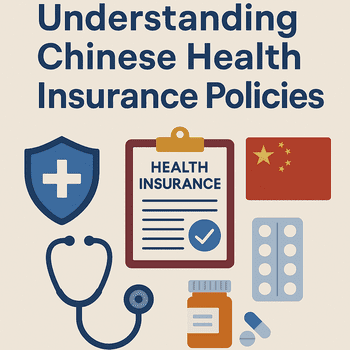
Navigating health insurance in China can be daunting, especially for expats unfamiliar with the system.
With significant reforms in recent years, understanding your rights, costs, and coverage options is essential.
This updated guide breaks down China’s current health insurance landscape, helping you make informed decisions about your healthcare needs in 2025.
Overview of the Healthcare System in China
China’s healthcare system consists of public and private options with varying quality and accessibility.
The system is organized into three tiers: community walk-in clinics (lowest tier), large hospitals, and specialist hospitals.
Healthcare quality tends to be significantly better in urban areas than in rural regions.
In China, you have four main healthcare options:
- Public medical institutions – Government-owned hospitals, wards, and community centers
- International/VIP wards (“gaogan bingfang”) – Premium sections within public hospitals offering better facilities and English-speaking staff
- Private hospitals – Facilities funded by the private sector
- International hospitals – Private hospitals meeting international standards
Public Health Insurance in China
China has undergone significant reforms to its public health insurance system.
As of 2025, there are two main public insurance schemes:
1. Urban Employee Basic Medical Insurance (UEBMI)
- Eligibility: Mandatory for employees in urban areas (both Chinese and foreign workers with work permits)
- Funding: Contributions from both employers and employees
- Coverage: Comprehensive coverage for inpatient and outpatient services
- Balance: Maintains a substantial cumulative balance (501.5 billion yuan as of 2023)
2. Urban and Rural Resident Basic Medical Insurance (URRBMI)
- Background: Formed in 2016 by merging the New Rural Cooperative Medical Scheme (NRCMS) and Urban Resident Basic Medical Insurance (URBMI)
- Eligibility: Covers non-employed urban residents, students, retirees, and rural residents
- Funding: Government subsidies and individual premiums
- Challenges: Facing declining enrollment and financial pressures
Note: While public insurance covers many medical needs, it has significant limitations for expats, including language barriers, limited coverage for imported medications, and exclusions for non-working family members.
Private Health Insurance Options
Many expats opt for private insurance due to its advantages:
| Benefit | Description |
|---|---|
| Access to International Facilities | Treatment at hospitals with English-speaking staff and international standards |
| Comprehensive Coverage | Better coverage for specialist treatments, imported medications, and complex procedures |
| Shorter Wait Times | Avoid the long queues common in public hospitals |
| Direct Billing | Many international insurers offer direct billing with partner hospitals |
| Global Coverage | Options for coverage during travel or repatriation if needed |
Cost of Health Insurance in China (2025)
| Plan Type | Annual Cost (USD) | Coverage |
|---|---|---|
| Basic Plans | $500–$1,500 | Inpatient treatment, hospitalization, and emergency care |
| Mid-Range Plans | $1,500–$5,000 | Inpatient, outpatient, and some dental or maternity services |
| Comprehensive Plans | $5,000–$10,000+ | Full coverage including dental, vision, maternity, mental health, and international care |
Source: Ikky In China, 2025
Factors Affecting Insurance Costs
Several factors influence the cost of health insurance for expats:
- Age: Premiums increase with age due to higher health risks
- Coverage Type: More comprehensive plans cost more
- Pre-existing Conditions: May increase premiums or be excluded
- Location: Higher premiums in major cities like Shanghai and Beijing
- Insurer Type: International insurers typically charge more but offer broader networks
How to Choose the Right Health Insurance in China
Assess Your Healthcare Needs
- Consider your age, existing health conditions, and anticipated medical needs
- Evaluate whether you need coverage for family members
- Determine if you need international coverage for travel
Check Provider Networks
- Verify which hospitals accept your insurance
- Look for insurers with direct billing arrangements to avoid paying upfront
- Confirm if your preferred hospitals are included in the network
Review Coverage Details
- Coverage area: Local hospitals vs. international facilities
- Pre-existing conditions: Coverage limitations and waiting periods
- Outpatient services: Coverage for routine doctor visits
- Medications: Coverage for prescription drugs, especially imported ones
- Emergency services: Including medical evacuation if needed
Consider Additional Benefits
- Dental and vision care
- Maternity coverage (typically with 10-12 month waiting periods)
- Mental health services
- Traditional Chinese Medicine (TCM) treatments
Application Process for Health Insurance
For Public Insurance (If Eligible)
- Employees are typically enrolled through their employer with monthly salary deductions
- Self-employed individuals can enroll through local social security offices
- Required documents usually include:
- Valid work permit/residence permit
- Employment contract
- Passport
- Recent photographs
For Private Insurance
- Research and compare plans from major providers
- Submit application with required documentation:
- Proof of residency
- Passport information
- Medical history (some insurers require medical examinations)
- Pay initial premium
- Receive insurance card and policy documents
Practical Tips for Navigating Healthcare in China
Language Barriers
- Learn basic medical phrases in Mandarin
- Keep a translated list of any chronic conditions, allergies, and medications
- Use translation apps like WeChat Translate or Baidu Translate
- Ask your insurer if they provide translation services
Emergency Situations
- Emergency numbers: 120 (medical), 999 (general emergency)
- Keep your embassy’s contact information readily available
- Be aware that state-regulated ambulances are limited; avoid unauthorized “black ambulances”
- Request a medical summary when discharged as information is not routinely shared
Medication Considerations
- Many Western medications are restricted or unavailable
- Check with your doctor and the Chinese Embassy before bringing medications
- Note that as of 2025, antipyretics (like ibuprofen) require a prescription
- Consider bringing a supply of essential medications (with proper documentation)
Recent Challenges in China’s Health Insurance System
The Chinese health insurance system is facing several challenges that may affect expats:
- Declining enrollment in URRBMI (25 million subscribers lost in 2022 alone)
- Rising premiums (38-fold increase from 2003 to 2023)
- Fund deficits in some regions
- Increasing healthcare costs
These challenges may lead to changes in coverage and costs, making it important to stay informed about policy updates.
Conclusion
China offers a complex but navigable health insurance landscape for expats.
While public insurance may be available to some foreign residents, most expats benefit from comprehensive private coverage that provides access to international-standard healthcare facilities.
When selecting insurance, consider your specific healthcare needs, preferred facilities, and budget constraints.
Whether relying on employer-provided insurance or purchasing your own policy, ensuring proper coverage will provide peace of mind and quality medical treatment during your stay in China.
Regularly review your policy as both your needs and the Chinese healthcare system continue to evolve.



